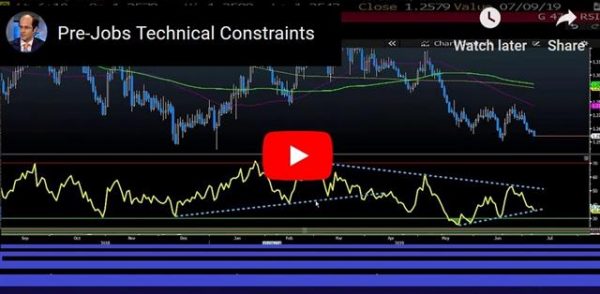Just a few words on the ECB before we cover the jobs report. Ollie Rehn, Finnish central bank governor laid out the ECB’s path forward in the clearest terms yet and it could virtually ensure the ECB will ease. What’s increasingly difficult to understand is the set of signals that has central banks so concerned (more below). US and Canada jobs are due up next. The Video for Premium subscribers is posted below, laying out the key technical constraints for the USD.
Markets were relatively quiet on Thursday but Rehn – Once an ECB hawk – told Boersen Zeitung that easing is needed now. He talked about forward guidance, cutting the ECB’s deposit rate or resuming QE. The call was so direct and dovish that was it bordered on alarmist. In late May, Rehn said the base case was to wait longer before raising rates because there was a soft path.
In terms of economic data, there is nothing blatant to justify such a dramatic shift. It’s clear this is all about the bond market. German yields are now below the ECB’s deposit rate of -0.40% all the way out to 10 years. Yields have fallen dramatically, including in Italy where they have fallen more than 200 basis points since October. Yield curves everywhere are inverted.
The ECB is terrified about falling inflation expectations in markets. Easing at this point sounds like a done deal and the market is increasingly convinced that the BOE will follow and that China-US trade talks have solved nothing.
One line of thinking is that central banks know something we don’t – maybe that Trump is going to ramp up the trade war against Europe. But history has shown that central banks are rarely privy to special knowledge and the Fed certainly wasn’t when it was hiking in December.
There seems to have been a sea change on inflation views along with a bond-buying mania. To combat it, the ECB is willing to risk diving deeper into experimental policy to perhaps push up inflation a few ticks. Is that risk worth the reward? It’s tough to see how it is.
Onto US and Canada Jobs
The day ahead will be a big one in terms of sorting out how the underlying US economy is performing. US non-farm payrolls are forecast at 160K and that leaves the market in a delicate spot. If jobs are higher than 200K, then expect a USD rally along with risk aversion as Fed cuts are questioned. If jobs are below 100K and earnings come in within expectations, expect a USD slump along with risk aversion on fear of an economic slowdown. The question becomes: “Would a string jobs report mean no July rate cut or only a 25-bp cut instead of a 50-bp cut?”. Ashraf gives his assessment before answering this in today’s Premium video.
In Canada, meanwhile, the country is close to the best jobs growth in a decade over the past 3, 6 and 12 month periods, while its Citi economic suprise index is at multi-decades high. Canada unemp rate seen at 5.5% from 5.4%, while Canada payrolls expected at 10K from 28K. A soft report will be brushed aside while one above the +10K consensus will emphasize that Canada is a rare spot of economic acceleration. Traders may also consider USDCAD longs in the event that US data exceeds expectations as that would weigh on risk appetite, especially if Canada jobs fail to beat.

